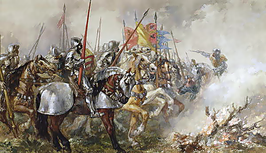
King Henry Fifth's Conquest of France
Encyclopedia
King Henry Fifth's Conquest of France (Child
#164; Roud
#251) is a British ballad which recounts a highly fictionalized version of the Battle of Agincourt
and the events surrounding it.
 In the ballad, King Henry
In the ballad, King Henry
sends his page to France to collect a tribute in gold that has not been paid for some while. Instead, the king of France sends back three tennis ball
s, so that the young king can "learn to play." (The gift of tennis balls also appears in Shakespeare's Henry V
; the play and other versions of the story refer to a ton of tennis balls.) Henry raises an army and invades France, and the king of France agrees to pay the tribute and give Henry "the finest flower that is in all France
" for his wife.
Francis James Child
and John Jacob Niles
points out some of the ballad's historical inaccuracies: France did not pay tribute to England, the English did not march to Paris after the battle, and the estimate of 10,000 Frenchmen killed is high. Henry's conscription, which in the ballad called on Cheshire, Lancashire and Derby and spared married men and widow's sons, did not do so in real life. The tennis balls are also disputed; some chroniclers mention them, but other historians conclude that they are probably a legend, possibly borrowed from a story of Darius and Alexander.
The song appears on Richard Thompson's 1000 Years of Popular Music
.
Child Ballads
The Child Ballads are a collection of 305 ballads from England and Scotland, and their American variants, collected by Francis James Child in the late nineteenth century...
#164; Roud
Roud Folk Song Index
The Roud Folk Song Index is a database of 300,000 references to over 21,600 songs that have been collected from oral tradition in the English language from all over the world...
#251) is a British ballad which recounts a highly fictionalized version of the Battle of Agincourt
Battle of Agincourt
The Battle of Agincourt was a major English victory against a numerically superior French army in the Hundred Years' War. The battle occurred on Friday, 25 October 1415 , near modern-day Azincourt, in northern France...
and the events surrounding it.

Henry V of England
Henry V was King of England from 1413 until his death at the age of 35 in 1422. He was the second monarch belonging to the House of Lancaster....
sends his page to France to collect a tribute in gold that has not been paid for some while. Instead, the king of France sends back three tennis ball
Tennis ball
A tennis ball is a ball designed for the sport of tennis,approximately 6.7 cm in diameter. Tennis balls are generally bright green, but in recreational play can be virtually any color. Tennis balls are covered in a fibrous fluffy felt which modifies their aerodynamic properties...
s, so that the young king can "learn to play." (The gift of tennis balls also appears in Shakespeare's Henry V
Henry V (play)
Henry V is a history play by William Shakespeare, believed to be written in approximately 1599. Its full titles are The Cronicle History of Henry the Fifth and The Life of Henry the Fifth...
; the play and other versions of the story refer to a ton of tennis balls.) Henry raises an army and invades France, and the king of France agrees to pay the tribute and give Henry "the finest flower that is in all France
Catherine of Valois
Catherine of France was the Queen consort of England from 1420 until 1422. She was the daughter of King Charles VI of France, wife of Henry V of Monmouth, King of England, mother of Henry VI, King of England and King of France, and through her secret marriage with Owen Tudor, the grandmother of...
" for his wife.
Francis James Child
Francis James Child
Francis James Child was an American scholar, educator, and folklorist, best known today for his collection of folk songs known as the Child Ballads. Child was Boylston professor of rhetoric and oratory at Harvard University, where he produced influential editions of English poetry...
and John Jacob Niles
John Jacob Niles
John Jacob Niles was an American composer, singer, and collector of traditional ballads. Called the "Dean of American Balladeers", Niles was an important influence on the American folk music revival of the 1950s and 1960s, with Joan Baez, Burl Ives, and Peter, Paul and Mary, among others,...
points out some of the ballad's historical inaccuracies: France did not pay tribute to England, the English did not march to Paris after the battle, and the estimate of 10,000 Frenchmen killed is high. Henry's conscription, which in the ballad called on Cheshire, Lancashire and Derby and spared married men and widow's sons, did not do so in real life. The tennis balls are also disputed; some chroniclers mention them, but other historians conclude that they are probably a legend, possibly borrowed from a story of Darius and Alexander.
The song appears on Richard Thompson's 1000 Years of Popular Music
1000 Years of Popular Music
1000 Years of Popular Music is a live album by Richard Thompson.The album was originally conceived after Thompson was ignored by Playboy magazine; initially meant simply as a list to be printed by the magazine, it was subsequently published into CD format. The songs comprising the tracklist cover a...
.

